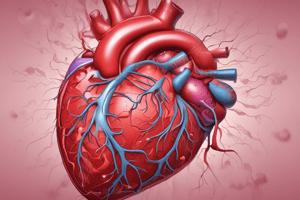Podcast
Questions and Answers
Left ventricular hypertrophy is associated with decreased metabolic demands.
Left ventricular hypertrophy is associated with decreased metabolic demands.
False (B)
What is the most common cause of systolic heart failure?
What is the most common cause of systolic heart failure?
Coronary artery disease
What are the primary manifestations of heart failure syndrome?
What are the primary manifestations of heart failure syndrome?
- Chest pain, abdominal pain, pedal edema
- Dyspnea, fatigue, fluid retention (correct)
- Nocturia, chest pain, pulmonary edema
- Confusion, shortness of breath, orthopnea
BNP levels greater than ______ pg/mL are indicative of heart failure.
BNP levels greater than ______ pg/mL are indicative of heart failure.
Flashcards are hidden until you start studying
Study Notes
Heart Failure
- Heart failure is a progressive clinical syndrome that occurs when the heart is unable to pump sufficient blood to meet the body's metabolic needs.
- It can result from any disorder that damages the pericardium, heart valves, myocardium, or ventricle function.
- The primary manifestations of heart failure are dyspnea, fatigue, and fluid retention.
- Outdated term "congestive heart failure" is inaccurate because patients may present without congestion.
Factors Affecting Prognosis
- Age
- Gender
- LVEF (left ventricular ejection fraction)
- Renal function
- Extent of underlying coronary artery disease
- Diabetes
- Anemia
- Blood pressure
- HF etiology (heart failure etiology)
- Drug or device therapy
Etiology
- Coronary artery disease is the most common cause of systolic heart failure, accounting for nearly 70% of cases.
- Ischemic heart disease and hypertension contribute to the development of heart failure.
- Systolic dysfunction (decreased contractility) can result from:
- Reduction in muscle mass (e.g., myocardial infarction)
- Dilated cardiomyopathies
- Ventricular hypertrophy:
- Pressure overload (e.g., systemic or pulmonary hypertension, aortic or pulmonic valve stenosis)
- Volume overload (e.g., valvular regurgitation, shunts, high-output states)
- Diastolic dysfunction (restricted ventricular filling) can result from:
- Increased ventricular stiffness
- Ventricular hypertrophy, hypertrophic cardiomyopathy
- Infiltrative myocardial diseases (e.g., amyloidosis, sarcoidosis, endomyocardial fibrosis)
- Myocardial ischemia and infarction
- Mitral or tricuspid valve stenosis
- Pericardial disease (e.g., pericarditis, pericardial tamponade)
Compensatory Mechanisms in Heart Failure
- Heart's decrease in pumping capacity results in compensatory responses to maintain cardiac output (CO).
- Responses are intended to be short-term after acute reductions in blood pressure or renal perfusion.
- Persistent decline in CO in heart failure results in long-term activation of compensatory responses, leading to functional, structural, biochemical, and molecular changes.
- Compensatory mechanisms include:
- Tachycardia and increased contractility
- Fluid retention and increased preload
- Vasoconstriction and increased afterload
- Ventricular hypertrophy and remodeling
Ventricular Hypertrophy and Remodeling
- Ventricular hypertrophy is a term used to describe an increase in ventricular muscle mass.
- Cardiac or ventricular remodeling is a broader term that describes changes in both myocardial cells and extracellular matrix, resulting in changes in the size, shape, structure, and function of the heart.
- Ventricular hypertrophy and remodeling can occur in association with any condition that causes myocardial injury, including MI, cardiomyopathy, hypertension, and valvular heart disease.
Heart Failure Models
- Older paradigms: cardiorenal model and cardiocirculatory model.
- Current paradigm: neurohormonal model.
Neurohormonal Heart Failure Model
- Initiating event leads to decreased CO.
- Becomes a progressive systemic disease mediated by neurohormones and autocrine/paracrine factors.
- Not a full explanation: drug therapies that target neurohormonal imbalances slow progression but do not stop disease progression.
Neurohormones and Autocrine/Paracrine Factors
- Neurohormones: angiotensin II, norepinephrine, aldosterone, natriuretic peptides (ANP, BNP, CNP), and arginine vasopressin.
- Autocrine/paracrine factors: proinflammatory cytokines (TNF-α, IL-6, IL-1β), endothelin peptides, and other circulating mediators.
Heart Failure Exacerbation
- Previously compensated patients may develop worsening symptoms that require hospitalization.
- Factors that exacerbate or may precipitate heart failure:
- Noncompliance with medications and dietary recommendations.
- Cardiac events: MI, ischemia, coronary artery disease, atrial fibrillation.
- Non-cardiac events: pulmonary infection, anemia.
- Inadequate or inappropriate medications.
- Most causes are preventable.
Clinical Presentation
- Patient presentation may range from asymptomatic to cardiogenic shock.
- Left ventricular failure:
- Dyspnea
- Orthopnea
- Paroxysmal nocturnal dyspnea
- Chest pain
- Pulmonary edema
- Fatigue
- Nocturia
- Confusion
- Right ventricular failure:
- Pedal edema
- Abdominal pain
- Shortness of breath
Studying That Suits You
Use AI to generate personalized quizzes and flashcards to suit your learning preferences.




